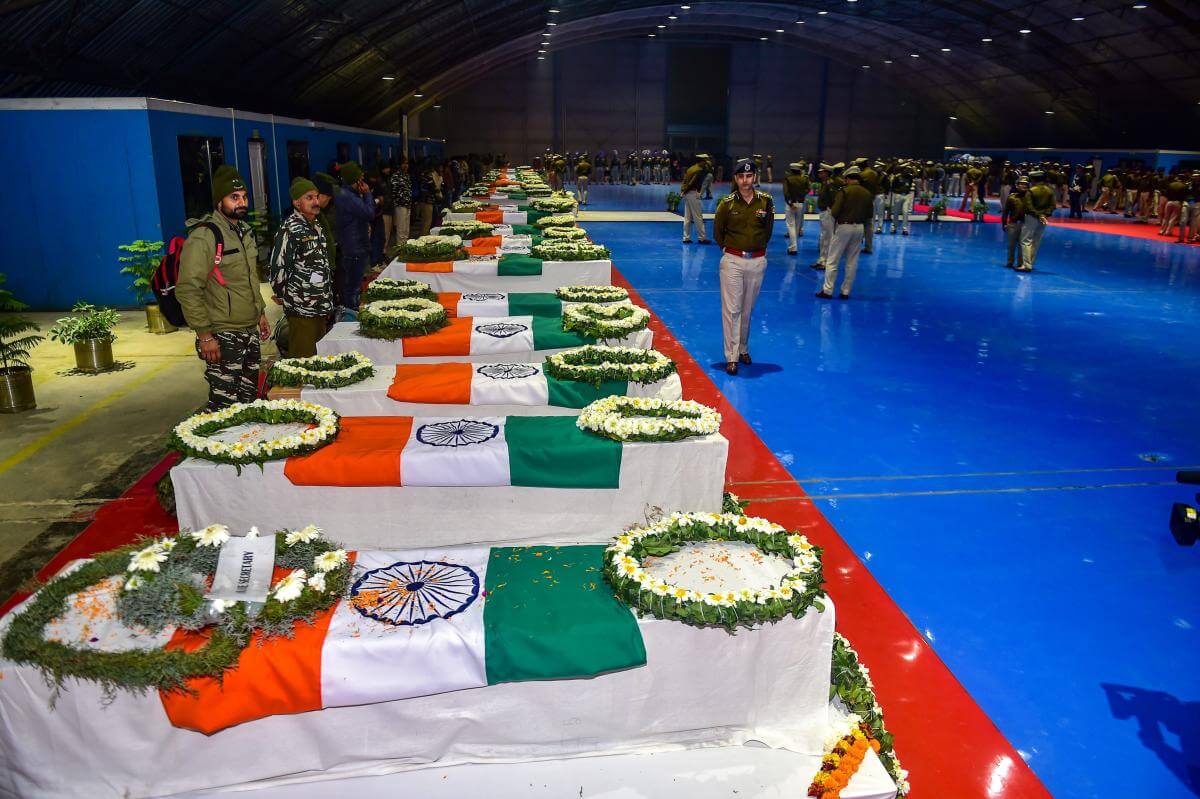Indian Prime Minister Narendra Modi paid homage to the victims of the Pulwama terror attack on the third anniversary of the fateful event. The incident, which was orchestrated by the Jaish-e-Mohammed (JeM), resulted in the death of at least 44 Central Reserve Police Force (CRPF) personnel while injuring 35 more.
I pay homage to all those martyred in Pulwama on this day in 2019 and recall their outstanding service to our nation. Their bravery and supreme sacrifice motivates every Indian to work towards a strong and prosperous country.
— Narendra Modi (@narendramodi) February 14, 2022
The Indian Army and other political leaders also paid tribute to the martyred CRPF personnel. On Twitter, the Additional Directorate General of Public Information for the Indian Army paid his respects on behalf of Army Chief General M.M. Naravane and “all ranks of the Indian army” to those who perished during the incident. Indian Home Minister Amit Shah also gave his “heartfelt tribute” to the CRPF soldiers for their “supreme sacrifice.”
Similarly, the Chief Ministers of Uttar Pradesh, Delhi and Rajasthan also expressed their tribute to those who perished in the incident. Meanwhile, senior opposition leader Shashi Tharoor said that the martyrs deserved “more than ritual mourning.” Instead, he called for an “accounting” of the incident, including the errors that led to the tragedy.
Our #PulwamaShahid deserve more than ritual mourning. They deserve an accounting of what went wrong &why. Who was responsible for the gross errors that led to this tragedy. What we are doing to ensure that it never happens again. That would be a fitting way to honour their memory pic.twitter.com/o7wE32d0sS
— Shashi Tharoor (@ShashiTharoor) February 14, 2022
The Incident
At 3 pm on February 14 in 2019, a JeM terrorist, later identified as Adil Ahmad Dar, rammed a vehicle filled with explosives into a bus carrying CRPF personnel, killing 44 and injuring 35. The attacked vehicle was part of a convoy comprising 78 buses carrying over 2,500 CRPF personnel who were travelling from Jammu to Srinagar.
After departing from Qazigund, the bus was met with a vehicle equipped with around 80 kilograms of explosives on the Jammu-Srinagar highway. The fatal incident is considered to be the deadliest attack on Indian military personnel in Kashmir during the last two decades.
The attack led to domestic political turmoil; several opposition leaders, including the leader of the Indian National Congress, Rahul Gandhi—and many other state leaders like Mamata Banerjee, Farooq Abdullah, and Arvind Kejriwal—questioned the possibility of the ruling government orchestrating the attack to further their political ambitions in the national elections, though these allegations have not been proven.
India’s Response
The deadly incident resulted in heightened tensions between India and Pakistan. Soon after the incident, PM Modi said on February 17: “I feel the same fire in my heart that’s raging inside you.” He added said that Indian forces have been given a free hand in deciding the “place, time, intensity, and nature” of their response to the attack. He further declared that “all tears will be avenged.” India also summoned the Pakistani envoy in New Delhi to protest the attack.
On February 26, the Indian Air Force launched an aerial attack on a JeM camp in Balakot, marking the first time that the Indian warplanes crossed the Line of Control (LOC) with Pakistan to launch an attack since the Indo-Pakistan War of 1971. The operation was conducted by 12 Mirage 2000 jets that were equipped with SPICE 2000 and Popeye precision-guided munitions.
Furthermore, the Indian Air Force also blocked an attempt by the Pakistani Air Force on February 27 as three jets tried to enter India. They were pushed back by six Indian jets. However, during the operation, Air Force Wing Commander Abhinandan Varthaman was captured by Pakistan after his MiG 21 Bison was shot down during an aerial standoff with Pakistani pilots.
In July 2021, Indian security forces also conducted an operation in the Dachigam National Park within the Kashmir Valley and executed two JeM militants, one of whom was identified as the mastermind of the 2019 Pulwama attack. In January of this year, the Kashmir police also declared that Samir Dar, a top JeM commander, and two other accomplices had been killed in an encounter on December 30 last year. With this, it was declared that the last surviving terrorists involved in the Pulwama attack had been killed by Indian security forces.
Aftermath
The Pulkwama attack reignited the hostilities between the two neighbouring nations, as Indian leaders have often accused the Pakistani government of supporting and promoting terrorist activities against India. The controversy deepened further when Fawad Chaudhary, Pakistan’s Minister of Information and Broadcasting, celebrated the Pulwama attack as a “major achievement” for the ruling party and opposition leaders while speaking to the National Assembly. “Humne Hindustan mein ghus ke unko maara (We hit India in their home). Our success in Pulwama is a success of this nation under the leadership of Imran Khan,” he said.
After facing criticism by Indian media houses who reported this as an admission of the Pakistan government’s involvement in the attack, he claimed that his words had been “misinterpreted.” “My statement is very clear. It was about Operation Swift Resort that we undertook after India dared to enter into Pakistan territory on Balakot. I was talking about the post-Pulwama operation that Pakistan undertook,” he said.

